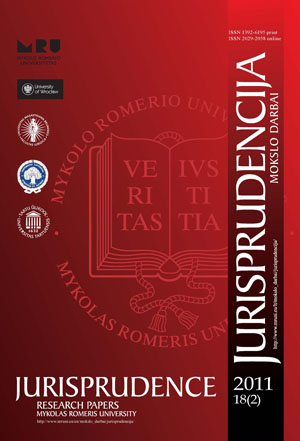Vaistų ir maisto papildų teisinio atribojimo teoriniai ypatumai ir praktinės problemos
The Theoretic Features and Practical Problems of Legal Attribution of Medicinal Products and Food Supplements
Author(s): Indrė ŠpokienėSubject(s): Law, Constitution, Jurisprudence
Published by: Mykolas Romeris University
Keywords: medicinal product; food supplement; definition of medicinal product; advertising of food supplements
Summary/Abstract: This paper presents an analysis of the issue that as yet not been extensively researched in the doctrine of Lithuanian and foreign law: the issue of legal distinguishing between medicinal products and food supplements. In order to analyze the problems of theory and practice, the structure of the paper is divided into two parts. The first part concentrates on the main features of medicinal products and food supplements in accordance with the case law of the Court of Justice of the European Union (CJEU). It is established that medicinal products must comply with one of these descriptions: be made and aimed towards healing and preventing sicknesses; cause serious threats to health or have health-hazardous secondary effects; and have very intense effects on physiological features of human organisms. Food supplements in theory should not have these features. However, sometimes in practice preparations identified as food supplements have large doses of certain medicinal substances or other ingredients (e.g. alcohol, plant extracts, vitamins, amino acids, and etc.) that present threats to human health. The practice of the CJEU shows that counterbalancing free movement and public health protection interests is problematic in this area. Moreover, even after adoption of many EU and national legal acts, the food supplement market is not adequately regulated or sufficiently harmonized. The first section of the second part of the paper is aimed at the analysis of this practical problem. Evaluation of the situation in Lithuania revealed that since 1 March 2010, food supplements imported into Lithuanian from the countries of the European Economic Area do not have to be notified, and after the dismissal of the committee that used to attribute products to adequate categories, there aren’t any more possibilities for successful monitoring of food supplements. The responsibility for food supplement safety is presently restricted only to manufacturers or suppliers, thus the author raises the question on whether a reasonable balance between interests of business and human life and health protection is maintained in Lithuania. The author suggests creating the mechanism for implementation of the rule on supremacy of medicinal product provisions, as provided in Article 12 of Directive 2002/46/EB and Article 9 (6) of the Lithuanian law on pharmacy, in cases where there are doubts for attributing the preparation to the group of medicinal products or food supplements. The article also focuses on another practical problem of distinguishing between medicinal products and food supplements, i.e. misleading advertisement. It is relevant because often advertisements fail to comply with the prohibition on indicating or implying about healing or preventing sicknesses features of food supplements, although there is no sufficient evidence to base these statements. The control of such advertisement on the Internet is especially problematic. In order to
Journal: Jurisprudencija
- Issue Year: 18/2011
- Issue No: 2
- Page Range: 769-790
- Page Count: 22
- Language: Lithuanian

